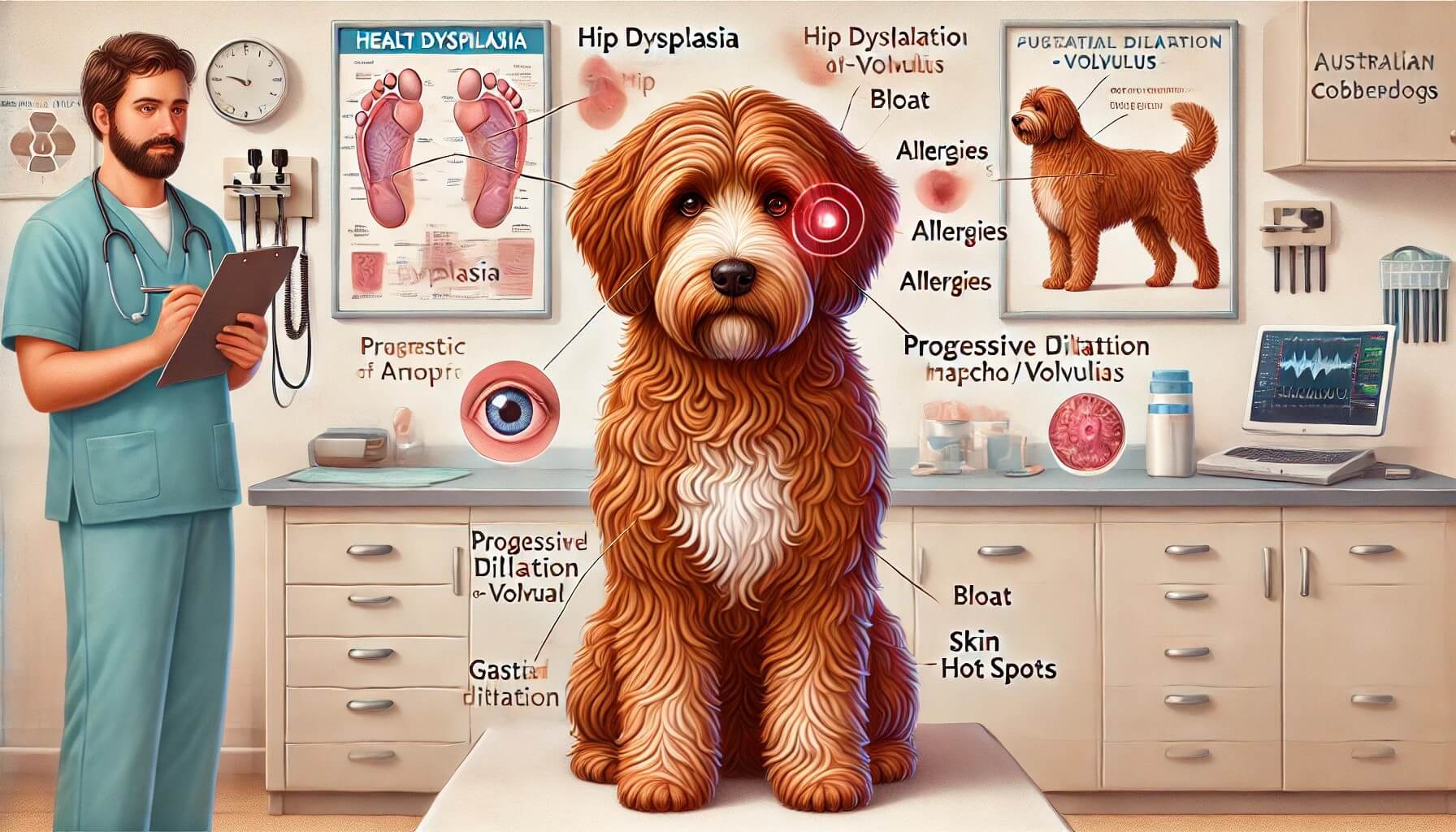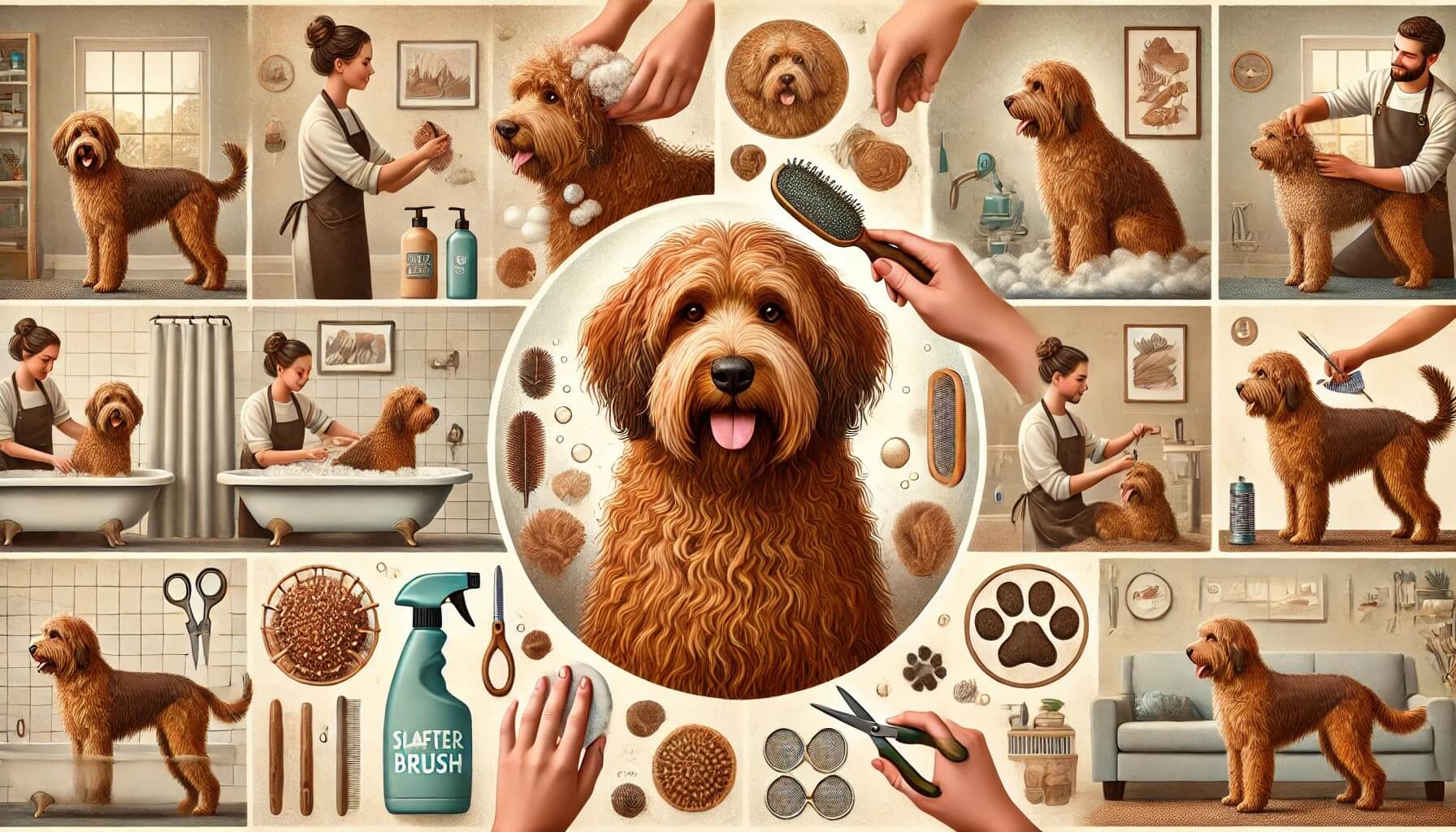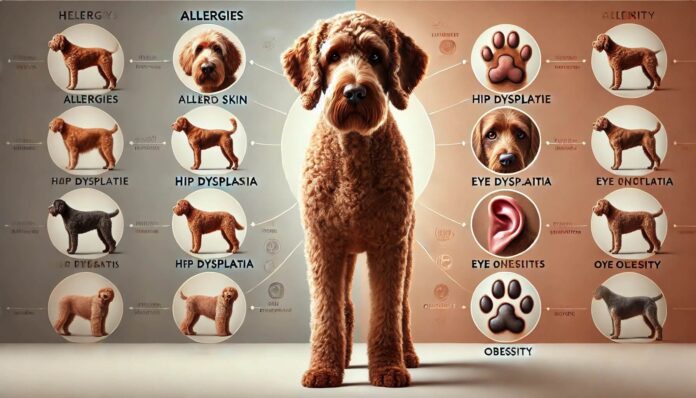Australian Cockerdogs are known for their gentle nature, intelligence, and hypoallergenic coat, making them a favorite choice for families. But like any breed, they can face certain health challenges that every owner should know about.
In this comprehensive guide, we’ll explore common health issues in Cobberdogs, how to prevent them, and the best ways to keep your furry friend healthy and happy throughout their life. Whether you’re a first-time owner or a seasoned Cobberdog parent, understanding their health needs is key to providing them with the best care possible.
Understanding Australian Cobberdogs: A Brief Overview

A short declaration of the Australian Cobberdog. This breed was created in Australia by crossing different dogs to make a friendly, hypoallergenic, intelligent pet. The aim was to develop a breed that would be suitable as both a service dog and a family pet, which has made them a great match for the households of many.
The Cobberdog has some key features that set it apart. They are recognized for their mild disposition, which makes them wonderful with kids and other animals. They’re also knowledgeable, making untrainable dogs ideal for first-time and veteran owners. However, in addition to their adorable personality, one of the reasons we humans become attached to them is their distinct hypoallergenic nature.
Protect your dog from park-related health risks. Find out more about the Derry Dog Park Health Issue here.
This is quite beneficial to those who have allergic reactions. Cobberdogs have soft, curly, or wavy hair that does not leave fur all over your furniture or clothes. For those who struggle with pet dander but still long for the joy of having a dog, this makes these dogs an ideal choice. So, the Australian Cobberdog is the perfect companion dog with the added benefit of being hypoallergenic.
Common Health Issues in Australian Cobberdogs
![]()
Genetic Health Concerns
As with all breeds, Australian Cobberdogs are susceptible to certain hereditary health conditions. They are generally healthy dogs, but some conditions are more common in this breed. Hip dysplasia is one of the most common; the joint doesn’t form correctly, causing pain and difficulty walking.
The notorious eye conditions (like cataracts or progressive retinal atrophy [PRA]) can also cause vision problems over time. In some lines, epilepsy is also a worry, leading to seizures that can alter a dog’s quality of life.
Responsible breeding is the main way to minimize these risks. Responsible, reputable breeders will conduct health screenings and genetic testing to ensure they’re breeding healthier dogs. These concerns can be reduced with careful breeding and by purchasing a Cobberdog from a breeder who prioritizes genetic health.
A healthy Chinook is a happy Chinook! Discover essential health tips: Click Here
Von Willebrand Disease (vWD)
Cobberdogs, like many other breeds, can also be affected by Von Willebrand Disease (vWD), a bleeding disorder. Dogs with vWD are born without a protein necessary for blood clotting. As a result, they’re more likely to bleed excessively, even from small wounds.
Symptoms can include nosebleeds, gums that tend to bleed easily, or excessive bleeding following surgery or injury. If you see these signs, it’s best to have your dog diagnosed. A straightforward blood test can rule in vWD.
Treatment generally consists of avoiding situations that could result in bleeding, but for more serious cases, medication or blood transfusions may be necessary to manage the disorder.
Preventive care is key! Learn how to keep your Chinook safe from common health risks: Read More
Allergies in Cobberdogs
Cobberdogs founders designed highly hypoallergenic dogs, but that doesn’t mean they are allergy-proof. These dogs may still develop sensitivities to allergens such as pollen, specific foods, or flea bites. Cobberdogs are more susceptible to common allergens such as pollen and dust mites, as well as specific ingredients present in their food.
Signs of itchy skin, ear infections, or digestive issues in your Cobberdog could signal an allergic reaction. Managing allergies means identifying triggers with your vet. A diet change or medication may help, and regular grooming may limit exposure to environmental allergens.
From hip dysplasia to allergies—know what affects Chinook dogs! Full guide here: Chinook Dog Health Issues
Preventing Health Issues in Your Australian Cobberdog

Importance of Early Veterinary Checkups
Regular veterinarian check-ups are important for your Australian Cobberdog’s health. They catch symptoms that can lead to more serious health issues with early tests. Your vet will conduct health screenings, look for common genetic conditions, and suggest an appropriate vaccination schedule to protect your dog against diseases such as parvovirus, distemper, and rabies.
Early checkups also allow your vet to start building a relationship with your dog, which makes future visits less stressful. Regular vet visits can help keep your Cobberdog healthy and happy for years.
Proper Diet and Nutrition for Cobberdogs
Cobberdogs should receive a well-balanced diet to help maintain good health. Feed them high-quality dog food that includes lean proteins, healthy fats, and fiber to help support their energy and growth.
Cobberdogs are prone to allergies, so it’s best to opt for hypoallergenic dog food if your dog has sensitivities. Be mindful of any food allergies — scratching, upset stomach — and modify your diet.
A few Cobberdogs may benefit from omega-3 fatty acids or glucosamine supplements for coat and joint health, respectively, as they age. Ask your vet what food and supplements are best for your dog’s needs. A good diet can avoid health problems and longevity, ensuring you have an active and vibrant Cobberdog.
Exercise and Mental Health
Cobberdogs are active and smart, so they require a lot of physical exercise to remain in shape. Walks run, or play sessions in the yard help them maintain muscle tone and keep those joints moving. It’s also vital to keep them occupied by doing something that stimulates their minds.
Puzzle toys, training sessions, or agility exercises are great methods to meet your Cobberdog’s mental stimulation needs.
Cobberdogs need a lot of mental stimulation. Otherwise, they can become prone to behavioral problems, such as barking or chewing everything they touch.
Dog owners desire a healthy physical and mental companion, so providing both kinds of exercise is essential to ensure the dog remains well-adjusted and happy. Keep in mind a happy Cobberdog is a tired Cobberdog!
Essential Grooming Tips for a Healthy Australian Cobberdog
Coat Care and Grooming Routine
One highly popular aspect of the Australian Cobberdog is its non-shedding coat. But being non-shedders doesn’t mean no grooming is a snap. Regular grooming is essential to keep their coat healthy and shiny.
Cobberdogs have long wavy or curly fur that can mat easily without regular grooming. You should aim for two to three times a week to control matting and keep your dog’s hair free from tangles.
Mismanagement of the coat can also lead to skin irritation. Regular washing (every 6-8 weeks) with a mild, hypoallergenic shampoo can help keep their skin healthy and free from irritants.
Focus on places where mats can form, including under the ears or behind the legs. Regular grooming prevents such problems and ensures your Cobberdog stays comfortable.
Ear and Eye Care
Cobberdogs have floppy ears, which make them more susceptible to ear infections, a common problem in hairy-eared breeds. To prevent infections, regularly check your dog’s ears for dirt, wax buildup, or signs of redness. Keep their ears free of debris with a gentle ear cleaner recommended by your vet.
Regarding eye care, Cobber dogs may be susceptible to various eye conditions, including cataracts or conjunctivitis. Be sure to wipe around their eyes frequently; look for signs of redness, discharge, or chronic squinting. Call your veterinarian immediately if any of these symptoms develop. With regular maintenance, your Cobberdog’s ears and eyes will be healthy.
Dental Hygiene
Cobberdogs require effective oral care, the same as humans, to keep their teeth and gums healthy. Cobberdogs who do not receive regular brushing may also develop tartar, smelly breath, and, potentially, gum disease. You should brush your teeth at least two to three times a week with a canine-friendly toothbrush and toothpaste.
Besides brushing, dental treats and chew toys can lessen plaque buildup. Specific dog dental products help achieve better oral hygiene. Regularly cleaning your Cobberdog’s teeth will help keep them from developing painful dental problems and keep them happy and healthy.
Read our dog dental health guidelines for tips on keeping your pet’s teeth clean.
How to Detect and Treat Common Health Issues in Cobberdogs
Symptoms of Health Problems
As a dog owner, it’s critical to be aware of the signs of illness early on to obtain the appropriate care for your Cobber dog as early as possible. As with other breeds, Cobberdogs can also have mild symptoms before major health problems appear.
If this is the case and you collar your canine limping or have difficulty standing, it might be a sign of hip dysplasia or other joint concerns, which are common in the breed. If they tend to itch more than normal, it may indicate allergies from food or the environment.
Look for changes in eating habits, energy levels, or behavior — any of these can be indications that health issues exist. If hip dysplasia is confirmed in a Cobberdog, this condition often manifests as signs of stiffness, difficulty walking, and reluctance to jump.
For Cobberdogs who are allergic, you may see skin rashes, ear infections, or digestive issues. The earlier it is caught, the more successful the treatment is likely to be, so trust your instincts if something isn’t feeling right.
Veterinary Treatments and Options
Once your Cobberdog develops breed-specific health issues, the correct treatment is critical to finding triage and managing the problem. So, for example, if your dog has hip dysplasia, the vet may prescribe joint supplements, pain relief medication, and, if the condition is advanced, surgery to improve mobility.
If allergies are causing the problem, antihistamines, specialized shampoos, or even dietary changes can help bring relief.
By consulting with a veterinary specialist when your dog’s condition calls for them, they will deliver treatment plans specifically designed for your dog. An ophthalmologist will treat your eye conditions, and an orthopedic specialist will fix your joints.
Know when to call in the experts—A specialist may have the experience to intervene quickly enough to save your Cobberdog from more unpleasant treatments further down the line.
Curious about what to expect after a dental cleaning? Explore the before and after guide to dog dental cleaning.
Senior Cobberdog Health: Caring for Your Aging Companion
Understanding Age-Related Health Changes
Your precious Australian Cobberdog is now in its golden years, and just like humans, there can be some age-associated health alterations. Older dogs, much like humans, can experience a decline in their physical and sensory capabilities.
Arthritis is commonly seen among senior Cobberdogs, leading to painful joints and stiffness and making it more difficult for them to jump, run, or climb stairs. You also might find your dog slower to rise after resting or seemingly uncomfortable when moving.
Cobberdogs that are older may also have hearing loss, in addition to any joint issues. If, however, your dog begins to ignore commands or does not respond as well to certain sounds, this could indicate that hearing is starting to fail.
Mature Cobberdogs are also more susceptible to some conditions, such as cognitive dysfunction syndrome (CDS), which results in confusion, anxiety, and disturbances to normal sleeping patterns. Knowing this will enable you to care for your friend and keep the dog comfortable and happy as they age.
Adjusting Their Diet and Exercise Plan
Diet and exercise requirements change as Cobberdogs age. Older dogs need a balanced diet that is gentle on their joints and digestive system. Seek foods formulated for senior dogs, which usually include glucosamine and chondroitin for joint health. You may also want to reduce the calories you feed them to avoid weight gain that can worsen arthritis or stress their heart.
Senior Cobberdogs need to moderate the amount of exercise they get. However, they still need physical activity with lower intensity than during their youth. Walk shorter distances, have easy play dates, and moderate exercises like swimming; these are excellent choices.
Mental stimulation is still essential, so add more interactive toys or short training sessions to maintain mental sharpness. If you make these adjustments, you can help your senior Cobberdog get through their golden years comfortably and joyfully.
How to Choose a Responsible Breeder to Avoid Health Issues
What to Look for in a Cobberdog Breeder
Answering these questions helps you choose a responsible breeder, one of the most crucial steps you can take to keep your Australian Cobberdog healthy. The health and care of their canine companions come first for a responsible breeder. They ought to be open about the potential health issues of the breed and show that it is working to minimize the risks with responsible breeding practices.
One of the biggest things you want to look for is a breeder who breeds for health in addition to looks, whose focus is on the genetic lines, which have a proven track record of being healthier and free from common conditions.
A responsible breeder will also be familiar with the breed’s specific needs and will gladly answer any questions you might have. They should permit you to meet the puppy’s parents and provide details about their health history. Choosing a responsible breeder means investing in the long-term health and happiness of your Cobberdog.
Health Testing and Certification for Breeding Dogs
Responsible breeders perform health testing to screen for hereditary diseases before breeding. These tests can be hip evaluations, which screen for hip dysplasia, or genetic testing, to determine predisposition to issues like epilepsy or eye problems.
Health testing drastically reduces the chance of genetic health issues being passed on, as only dogs with the best genes are bred.
Good breeders will also guarantee cleanliness and documentation for health tests conducted. This documentation provides assurance or peace of mind that your puppy has a parentage of healthy parents. Request to view these certificates before putting down a deposit with a breeder.
Frequently Asked Questions About Cobberdog Health
What are the signs that my Cobberdog is unhealthy?
Signs of an Unhealthy Cobberdog The signs of an unhealthy Cobberdog depend on the condition, but some common ones include changes in appetite, lethargy, difficulty moving, or excessive scratching. If your dog begins to whine, limp, have difficulty standing, or display unusual behaviors, then it’s time to visit the vet for a proper diagnosis.
How often should I take my Cobberdog to the vet?
For general health, you should visit your Cobberdog to your vet for a checkup at least once a year. Seniors or dogs with known medical problems may require more frequent care. Regular checkups will catch any potential problems sooner, so your dog’s health will be handled proactively.
Are Cobberdogs prone to any serious health issues?
Although the Cobberdog is generally a healthy breed, a few serious conditions affect it, including hip dysplasia, eye conditions, and allergies. These are generally manageable with proper care, but you need to catch them early on and have your vet check them regularly.
By selecting a responsible breeder and being vigilant about health screenings, you can reduce the risk of developing these health concerns.
Conclusion: Ensuring Your Australian Cobberdog’s Health and Happiness
Overall, these steps, teamed with regular trips to the vet, can help ensure that your Australian Cobberdog remains a healthy and happy part of your family for as long as possible.
Although Cobberdogs are a generally healthy breed, being aware of the common health problems they can experience — from genetic issues to allergies to age-related changes — can help you provide the best possible care.
Selecting a responsible breeder, monitoring their health, and following a proper grooming routine will help ensure your Cobberdog leads a long, happy life.
Keep in mind that the sooner you detect health issues, the better. Regular checkups, a balanced diet, and plenty of exercise will keep your Cobberdog healthy, happy, and around for many years.
If given the proper care, your Australian Cockerdog can live many years in good health and provide you with plenty of love and happiness!
Popular Article
Dental Health in Dogs Guidelines
Dog dental cleaning before and after
Dental disease dog teeth cleaning before and after
How long do dog dental cleanings take
What to Feed Dog After Dental Cleaning
Can dog annual vaccinations be done during dental cleaning
How often do dogs need dental cleaning
Can dogs get dental implants
Clindamycin Dosage for Dogs Dental
Dog Heat Cycle Calculator





